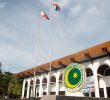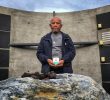Alfredo Ambat, Chairperson of the provincial Federation of Free Tappers in an interview with davaotoday.com, complained that the seven local traders / processors in the province are forming a cartel by manipulating the buying price of raw rubber product.
BY DANILDA L. FUSILERO
Davao Today
Makilala, North Cotabato – North Cotabato may boast of its dollar-earning rubber farm production with all 18 municipalities having rubber farms, covering 347 of its 543 barangays. But some 10,000 small rubber farmers complain of manipulation of prices and lack of support.
Such woes have exposed the shortfalls of conversion of rice and corn farms into cash crops, with farmers reeling over low earnings and food security.
Alfredo Ambat, Chairperson of the provincial Federation of Free Tappers in an interview with davaotoday.com, complained that the seven local traders / processors in the province are forming a cartel by manipulating the buying price of raw rubber product.
“Consistent kaayo ang pagbaba sa pamalit og goma, ug pareho sila tanan og presyo. Klaro kayo nga diktado kini sa pinakagamhanang trader / processor” (They have consistently lower the purchasing price of our raw rubber, and they all buy at the same rate. It is obviously dictated by the biggest trader),” said Ambat.
One of the traders, the Standard Rubber Corporation serves as direct exporter of the product to the international market.
Existing buying prices of dried raw rubber cuplumps here are pegged at PhP30 per kilogram for week-old production and PhP40/kg for 15-day-old production. Prices vary based on its Dry Rubber Content (DRC). A week-old production is said to be more watery by 50 percent compared to the 15 days old production.
The federation complained that local traders/processors intentionally exclude point decimal in the calculations of their sales.
“Kung ang imong goma motimbang of 45.6 kilos, ang kwentahon lang kay ang 45 kilos (If your rubber weighs 45.6 kgs, they will take off the point decimal and peg your price at 45 kilos),” said Ambat.
Such statements were however dismissed by the Department of Trade and Industry Provincial Director Anthony Bravo, saying that there are many factors that affect buying prices of raw rubber. “As an internationally-traded commodity, pricing is mainly dependent on the demand of the international market,” he said.
The federation have lobbied with Makilala Mayor Rudy Caoagdagan to increase the buying price of raw rubber.
The farmers also lobbied for a support fund for their plan to build a cooperative that will engage in centralized marketing. The group believes that having their own marketing program will at least save them from the hands of what they called “greedy rubber traders / processors” in the locality.
He added that while the province is pushing for the revitalization of the industry, its program failed to respond the needs of small rubber planters and tappers, the largest sector of the industry.
They challenge Caoagdagan, whose flagship program is rubber production and has provided free rubbing planting materials, to provide these demands.
“If we are really serious of producing quality raw rubber product, then the government should invest in enhancing the skills and knowledge of the tappers. We comprised the largest sector (of the industry) and yet we are the least attended to,” Ambat lamented.
In an interview over a local radio station here, Caogdan reported that his program has planted more than 2,000 hectares of rubber in the municipality. He said the program is in line with the national thrust to eradicate poverty and mitigate effects of the climate change phenomenon.
Local officials told the federation they will conduct a comparative study on the international Price Index of raw rubber vis-a-vis existing buying prices here.
Meanwhile, the North Cotabato Kilusang Magbubukid ng Pilipinas (KMP) will also conduct consultations with the rubber planters and tappers across the province.
KMP North Cotabato Chairperson Noli Lapaz said they will support the rubber farmers since they are again hardest hit with the government’s campaign for “export agricultural crops production”
Lapaz blames government’s “heavily-foreign market dependent agriculture framework” that induces farmers “to convert corn and rice farms into cash and industrial crops and merely serve as cheap source raw materials to these big foreign and local private capitalists.”
He further said that based on reports, more farms were either converted into rubber, palm tree and banana plantations.
KMP maintained that genuine transformation of the country’s agriculture sector should emanate from tenure security of the farmers and agri-workers over the land and should not jeopardize food supply sustainability.(Danilda L. Fusilero/davaotoday.com)










